Using and saving natural resources -> systems
Systems
A system is a group of interacting, interrelated, or interdependent elements forming a complex whole. In science, a system is a set of connected parts or components that work together to achieve a specific goal. There are various types of systems, including biological systems, ecological systems, and mechanical systems.
Types of Systems:
- Biological Systems: These are systems found in living organisms, such as the respiratory system, circulatory system, and nervous system.
- Ecological Systems: These systems involve the interactions between living organisms and their environment, including ecosystems, food webs, and environmental cycles.
- Mechanical Systems: These systems are made up of mechanical and moving parts, such as engines, gears, and levers.
Key Concepts:
When studying systems, it is important to understand the following key concepts:
- Components: The parts or elements that make up a system.
- Interactions: The ways in which the components of a system work together or affect one another.
- Input and Output: The materials, energy, or information that enters and leaves a system.
- Feedback: The process by which the output of a system is returned as input, potentially influencing future outputs.
- Emergent Properties: Characteristics or behaviors of a system that arise from the interactions of its components, rather than from any individual part.
Study Guide:
Here are some key points to focus on when studying systems:
- Identify examples of different types of systems and their components.
- Describe the interactions between the components of a system.
- Explain the input and output of a given system and how they contribute to its function.
- Understand the concept of feedback and its importance in maintaining the stability of a system.
- Discuss emergent properties and how they contribute to the behavior of a system as a whole.
By mastering these concepts, you will develop a deeper understanding of systems and their role in various scientific disciplines.
.◂Science Worksheets and Study Guides Second Grade. Using and saving natural resources
Study Guide Using and saving natural resources
Using and saving natural resources  Worksheet/Answer key
Worksheet/Answer key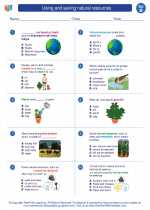 Using and saving natural resources
Using and saving natural resources  Worksheet/Answer key
Worksheet/Answer key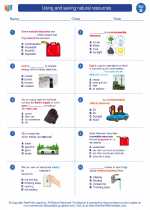 Using and saving natural resources
Using and saving natural resources  Worksheet/Answer key
Worksheet/Answer key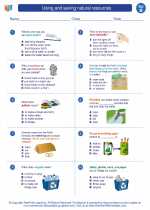 Using and saving natural resources
Using and saving natural resources  Vocabulary/Answer key
Vocabulary/Answer key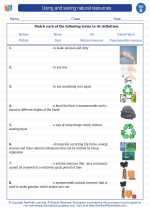 Using and saving natural resources
Using and saving natural resources  Vocabulary/Answer key
Vocabulary/Answer key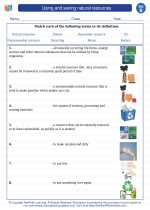 Using and saving natural resources
Using and saving natural resources 

 Worksheet/Answer key
Worksheet/Answer key
 Worksheet/Answer key
Worksheet/Answer key
 Worksheet/Answer key
Worksheet/Answer key
 Vocabulary/Answer key
Vocabulary/Answer key
 Vocabulary/Answer key
Vocabulary/Answer key

The resources above cover the following skills:
LIFE SCIENCE
Ecosystems: Interactions, Energy, and Dynamics
Obtain information from literature and other media to illustrate that there are many different kinds of living things and that they exist in different places on land and in water (e.g., woodland, tundra, desert, rainforest, ocean, river).